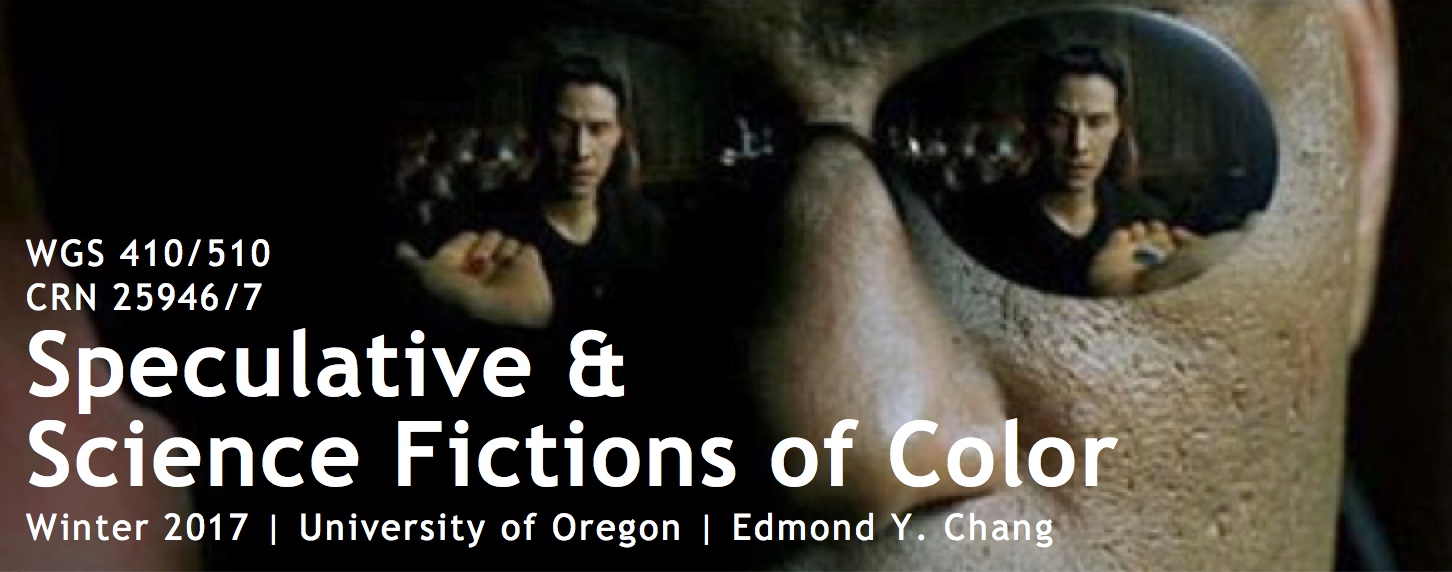Here is the course I am teaching in Winter Quarter 2017. I am looking forward to reprising a mix of my African American Science Fiction class with my Asian American Speculative and Science Fiction class with a couple of extra dashes from Latino and indigenous writers. Here is the course description:
WGS 410/510
Speculative & Science Fictions of Color
TuTh 12-1:20 PM
OUR COURSE will engage speculative and science fictions of color as political and vernacular theory, as strategies for thinking critically about the past, present, and future in order to imagine what this world (and others) would be like under different conditions and configurations of race, gender, sexuality, ability, and other formations. Sheree Thomas, editor of the collection Dark Matter: A Century of Speculative Fiction from the African Diaspora, said, “The science fiction and fantasy genres have always offered readers, bold, extraordinary ways by which to examine society. The results have often been visionary, with writers acting as unflinching voyeurs who deliver engaging, sometimes scathing critiques of our traditions, values, nightmares, and dreams.” Similarly, Betsy Huang argues in Contesting Genres in Contemporary Asian American Literature that “science fiction affords Asian American writers a unique way to engage in subversive political and ideological critique not by contravening genre conventions, but by using them to rewrite the rules of the genre.” We will survey and explore the intersections of literature, genre, bodies, media, and technology with particular attention to African American, Asian American, and other writers.
A REQUIREMENT for this class is a well-developed curiosity about the world, about the culture we live in, and about the cultural productions we imagine, produce, and consume. In other words, this class is about reading, critiquing, and analyzing our culture through different literatures and texts. We will engage different practices enjoying and analyzing literature and other media, as well as develop feminist and queer strategies, habits, and perspectives of reading, thinking, and writing. Foremost, we will read and research with pleasure and for pleasure. We will also close read for analysis. And lastly, we will read and deploy literature as theory, as dramatizing the concerns, wonders, struggles, and politics of lived life and experience.
SPECIFICALLY, our course goals include:
- We will develop and demonstrate a familiarity with a range of texts, terms, and theories of the study of speculative and science fiction, particularly written by African American, Asian American, and other writers.
- We will identify and articulate different feminist and queer ways to explore, close read, analyze, and critique literature and other texts.
- We will consider questions and intersections of race, gender, sexuality, ability, class, nation, culture, and power.
- We will use literature and popular culture as vernacular theory to think, talk, write, and interrogate the world around us.
Readings will include:
- W.E.B. Du Bois, “The Comet” (1920)
- Jack London, “The Unparalleled Invasion” (1910)
- Pauline Hopkins, Of One Blood (1902)
- George Schuyler, Black No More (1931)
- Alex Raymond, Flash Gordon (1934, excerpt)
- Samuel Delany, “Aye, and Gommorah…” (1967) & “Time Considered as a Helix of Semi-Precious Stones” (1968)
- Octavia Butler, Dawn (1987)
- S.P. Somtow, “The Thirteenth Utopia” (1979)
- Derrick Bell, “The Space Traders” (1992)
- Sherman Alexie, “Distances” (1993)
- Larissa Lai, Salt Fish Girl (2002)
- Ted Chiang, “Liking What You See: A Documentary” (2002)
- Nisi Shawl, “Maggies” (2004)
- Alice Sola Kim, “Beautiful White Bodies” (2009)
- Ken Liu, “The Paper Menagerie” (2012)
- Junot Diaz, “Monstro” (2012)
- Gene Luen Yang & Sonny Liew, The Shadow Hero (2014)
